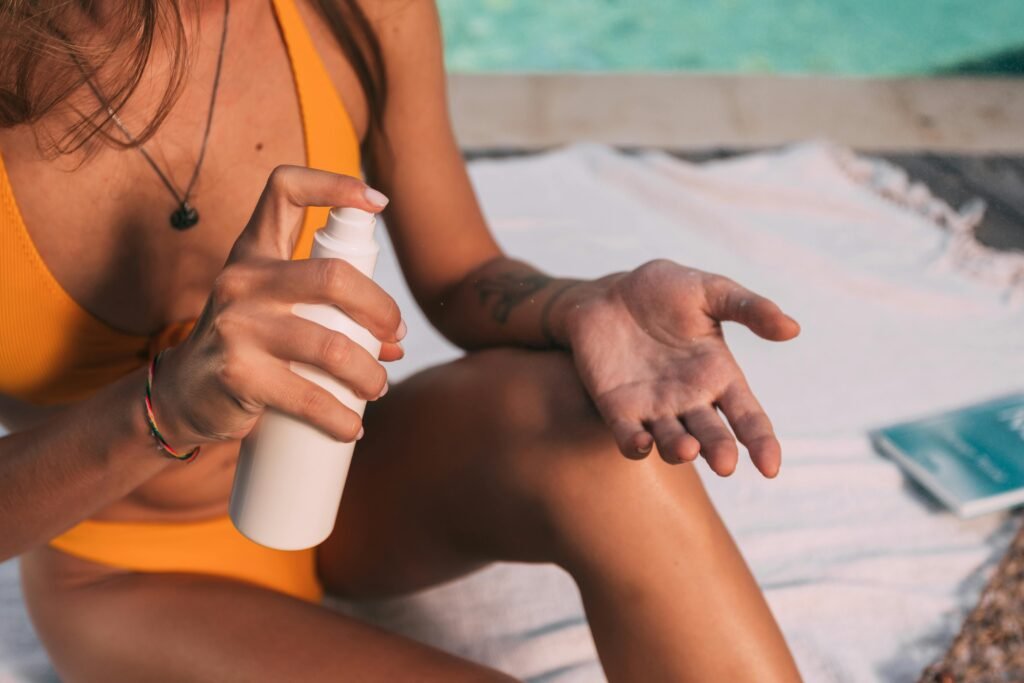Sunscreen isn’t just for your face. Your entire body deserves protection from the sun’s harmful rays! Whether you’re lounging by the beach, running errands, or even just sitting by a window, your skin is constantly exposed to UV radiation. That’s why using a body sunscreen is not just a good idea—it’s essential for healthy, youthful skin.
What Exactly is Body Sunscreen?


Before we dive into why it’s necessary, let’s define it. Body sunscreen is a specially formulated lotion, spray, or gel designed to protect your skin from UVA and UVB rays. Unlike facial sunscreens, which may be lighter and non-comedogenic, body sunscreens often focus on broader coverage, water resistance, and durability to keep up with your active lifestyle.
The Sun and Your Skin: A Complicated Relationship
The sun is great for vitamin D, mood-boosting, and giving you that warm, happy feeling. But it’s also responsible for skin aging, burns, and even serious conditions like skin cancer. Over time, unprotected exposure to the sun can cause premature wrinkles, dark spots, and loss of elasticity. And don’t think that just because it’s cloudy, you’re safe—UV rays can penetrate through clouds and still cause damage.
The Science Behind Body Sunscreen
When you apply body sunscreen, you’re essentially creating a shield between your skin and the sun’s radiation. Sunscreens contain active ingredients that either absorb or reflect UV rays, preventing them from penetrating deep into your skin. Here’s what makes body sunscreen effective:
- Broad Spectrum Protection – This ensures protection from both UVA (aging) and UVB (burning) rays.
- SPF (Sun Protection Factor) – The higher the SPF, the more protection it offers. SPF 30 or higher is generally recommended for daily use.
- Water Resistance – Especially important if you’re swimming or sweating.
Why Using a Body Sunscreen is Non-Negotiable
You might be wondering, “Do I really need body sunscreen every day?” The answer is a big YES! Here’s why:
1. It Prevents Sunburn (And We All Know That Hurts)
Sunburn isn’t just an annoying redness—it’s actual skin damage. When your skin burns, it means your DNA has been damaged by UV radiation, increasing the risk of premature aging and skin cancer.
2. It Lowers Your Risk of Skin Cancer
Skin cancer is one of the most common types of cancer worldwide, and UV exposure is a leading cause. Regular use of body sunscreen significantly reduces your chances of developing skin cancer, including melanoma, which can be life-threatening.
3. It Keeps Your Skin Looking Young
Ever seen someone who spends years tanning without protection? Their skin often appears leathery, wrinkled, and covered in dark spots. That’s because UV rays break down collagen and elastin, leading to premature aging. Body sunscreen helps keep your skin plump, smooth, and youthful.
4. It Prevents Hyperpigmentation and Uneven Skin Tone
If you struggle with dark spots or an uneven complexion, body sunscreen can be your best friend. Sun exposure worsens hyperpigmentation, making scars and discoloration more noticeable. A daily sunscreen habit helps prevent this.
5. It Protects You Indoors and Outdoors
Think you’re safe inside? Think again! UVA rays penetrate glass, meaning you’re still exposed while driving, sitting by a window, or working in a sunny room. Wearing body sunscreen indoors is just as important as when you’re outside.
Common Myths About Body Sunscreen
There are plenty of misconceptions about sunscreen. Let’s bust a few!
- “Darker skin doesn’t need sunscreen.” Wrong! While melanin provides some natural protection, people with darker skin tones can still experience sun damage and skin cancer.
- “I don’t need sunscreen if it’s cloudy.” Actually, up to 80% of UV rays penetrate clouds, so overcast days aren’t a free pass.
- “One application in the morning is enough.” Nope! Sunscreen should be reapplied every two hours, especially if you’re sweating or swimming.
- “Sunscreen is only for the summer.” The sun shines year-round, meaning body sunscreen is necessary every season.
How to Choose the Best Body Sunscreen
With so many options on the market, how do you pick the best one? Keep these factors in mind:
- SPF 30 or higher – This level of protection is ideal for daily use.
- Broad-spectrum protection – Guards against both UVA and UVB rays.
- Water-resistant formulas – Great for beach days and sweaty activities.
- Lightweight and non-greasy – So it feels comfortable on your skin.
- Reef-safe ingredients – If you’re swimming in the ocean, choose an environmentally friendly option.
How to Apply Body Sunscreen Like a Pro


Even the best body sunscreen won’t work if you don’t apply it correctly. Here’s the right way to do it:
- Apply generously. Most people don’t use enough—about a shot glass full is needed to cover your entire body.
- Don’t forget tricky spots. Ears, back of the neck, tops of feet, and hands need protection too.
- Apply 15 minutes before sun exposure. Sunscreen takes time to absorb into your skin.
- Reapply every two hours. More often if swimming or sweating.
- Layer with other sun protection. Hats, sunglasses, and UV-protective clothing add extra defense.
What Happens If You Skip Body Sunscreen?
Let’s say you decide to go without it—what’s the worst that could happen?
- Immediate Effects: Sunburn, irritation, and redness.
- Short-Term Effects: Tanned or darkened skin, uneven patches.
- Long-Term Effects: Wrinkles, sagging skin, dark spots, and increased risk of skin cancer.
Sunscreen is the Real MVP
At the end of the day, body sunscreen isn’t just another beauty product—it’s a necessity. It keeps your skin looking healthy, youthful, and protected from serious damage. So slather it on, reapply, and enjoy the sunshine responsibly. Your future self will thank you!
Frequently Asked Questions: Why Using a Body Sunscreen is Necessary
1. Why should I even bother using body sunscreen?
Okay, so picture this: you’re out in the sun, vibing, soaking up that golden hour glow, and then—boom—your skin starts to feel a little too toasty. That’s your body literally screaming for protection. Sunscreen isn’t just for avoiding sunburn (although, let’s be real, peeling skin is not a look). It helps prevent premature aging, hyperpigmentation, and even long-term damage like skin cancer. The sun’s UV rays are always working—whether you feel them or not—so your skin needs backup. Think of sunscreen as your skin’s personal bodyguard against damage you can’t even see yet.
2. Do I really need sunscreen if I have darker skin?
Absolutely. Just because you don’t turn into a tomato after five minutes in the sun doesn’t mean UV rays aren’t doing their thing. Melanin does offer some natural protection, but it’s not enough to keep your skin completely safe. People with darker skin tones can still get sunburned, develop sunspots, and, most importantly, are not immune to skin cancer. Plus, without sunscreen, hyperpigmentation (those stubborn dark spots that take forever to fade) gets even worse. If you want your skin to stay even-toned and healthy, sunscreen is a non-negotiable.
3. Isn’t sunscreen only for my face? Why should I apply it to my body too?
Your face gets all the attention, but let’s not forget the rest of you! Your arms, legs, shoulders, and even your back take in just as much sun, if not more. Ever had a sunburn on your shoulders? That pain is next level. And let’s not even talk about how your hands are constantly exposed to the sun, aging way faster than the rest of you. Body sunscreen makes sure your skin everywhere stays smooth, youthful, and damage-free. Plus, if you’re wearing a cute tank top or shorts, your skin is totally unprotected unless you slather on some SPF.
4. If I’m mostly indoors, do I still need to wear sunscreen?
Hate to break it to you, but yes. Windows don’t block UVA rays—the ones responsible for aging and long-term skin damage—so even if you’re just chilling inside, you’re still getting hit with radiation. Ever noticed one side of your face or arm looking slightly more tanned than the other? That’s probably from driving or sitting near a window without sunscreen. Also, if you work in front of screens all day, blue light exposure is another sneaky culprit for skin damage. So even if you’re not sunbathing, SPF is still your skin’s bestie.
5. Aren’t some sunscreens bad for the environment? What are my options?
You’re not wrong—some sunscreens contain chemicals like oxybenzone and octinoxate, which can harm coral reefs and marine life. But that doesn’t mean you should ditch sunscreen altogether. The good news? There are eco-friendly, reef-safe options made with minerals like zinc oxide and titanium dioxide that still do the job without wrecking the environment. Plus, they’re often better for sensitive skin too! So you can stay protected and keep the planet happy. Win-win.
6. Can’t I just use makeup or body lotion that has SPF?
Nice try, but not really. While makeup or lotion with SPF sounds convenient, they usually don’t provide enough protection on their own. Most people don’t apply nearly enough product to actually get the SPF level stated on the bottle. Plus, sunscreen needs to be reapplied throughout the day, and let’s be honest—you’re probably not caking on foundation or lotion every two hours. Using a dedicated body sunscreen ensures you’re actually getting the full benefits.
7. What’s the best way to apply body sunscreen for the best protection?
Here’s the deal: most people don’t use enough. You need about a shot glass worth (yes, like an actual shot) for your whole body. Apply it 15–30 minutes before heading out so your skin actually absorbs it. And don’t just slap it on—rub it in evenly, making sure to get all those sneaky spots like behind your knees, your feet, and even the tops of your ears. Oh, and reapply every two hours (or more if you’re sweating or swimming). If you want that effortless, sun-kissed glow without the damage, sunscreen is your secret weapon.
